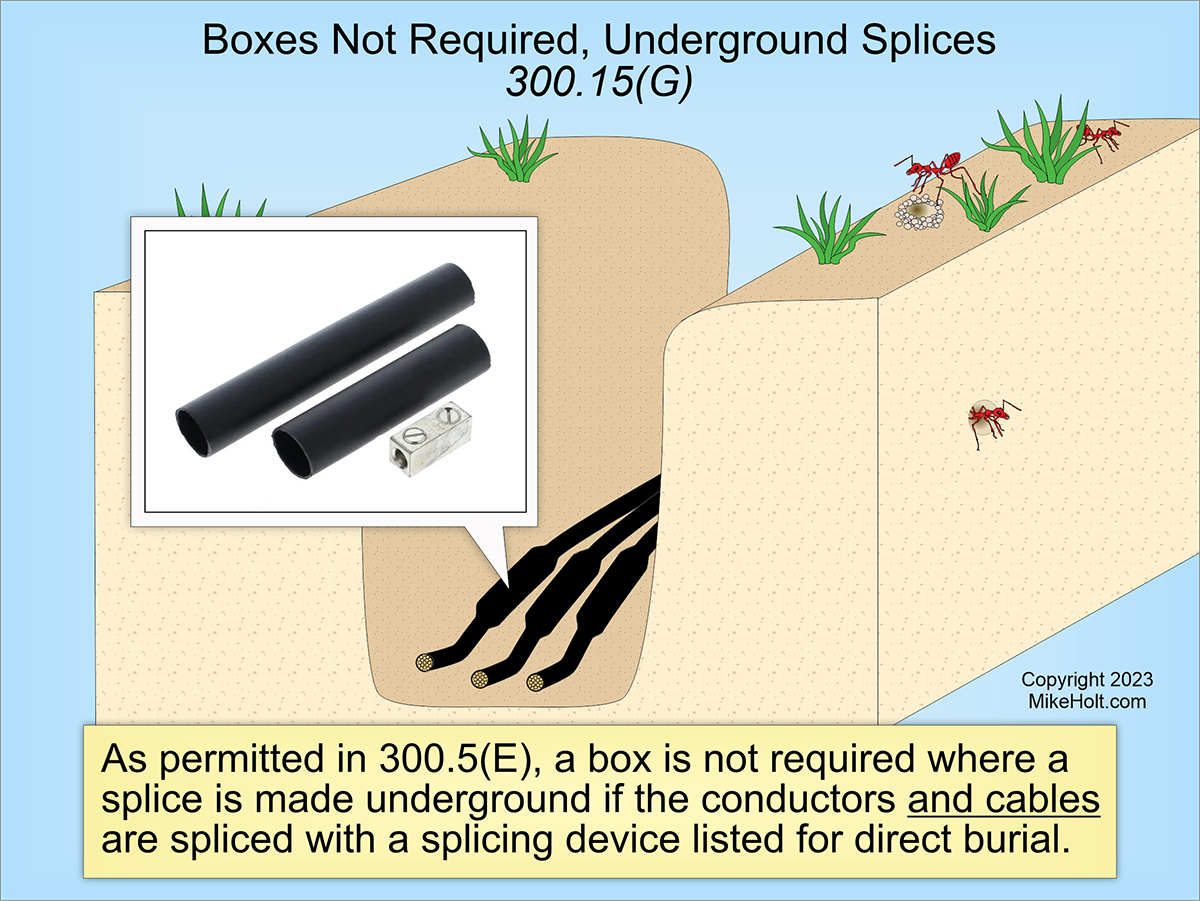|
For EC&M Magazine
By Mike Holt, NEC® Consultant
Here's the follow-up to yesterday's newsletter.
This includes the answers to the questions sent, so you can see how you did.


Figure 01
|
 |
|
Figure 01
|
For EC&M Magazine
By Mike Holt, NEC® Consultant
Here's the follow-up to yesterday's newsletter.
This includes the answers to the questions sent, so you can see how you did.

Note: The answers to these questions are based on the 2020 NEC.
Q1. What are the rules related to conductor splicing?
300.15 Boxes or Fittings, Splices and Terminations.
(A) Wiring Methods with Interior Access. A box is not required for wiring methods with removable covers such as wireways, multioutlet assemblies, and surface raceways.
(G) Underground Conductor and Cable Splices. A box is not required where a splice is made underground if Type UF or USE conductors are spliced with a splicing device listed for direct burial.‚Figure 01
Author's Comment:
The only conductors permitted to be direct buried are Type UF [340.10(1)] and Type USE [338.10(B)(4)(b)(2)].
Q2. What are the rules for the number of conductors permitted in a raceway?
300.17 Number and Size of Conductors in a Raceway. Raceways must be large enough to permit the installation and removal of conductors without damaging their insulation.
Author's Comment:
When all conductors within a raceway are the same size and of the same insulation type, the number of conductors permitted, or the raceway size can be determined using Annex C [Note (1) of Chapter 9].
Example
Question: How many 12 AWG, THWN-2 conductors can be installed in ¾ EMT?
(a) 10 (b) 12 (c) 14 (d) 16
Answer: (d) 16 [Annex C, Table C.1]
Author's Comment:
â–ºWhen different size conductors are installed in a raceway, conductor fill is limited to the percentages in Table 1 and Note (6) of Chapter 9.
â–ºFollow these steps for sizing raceways:
â–ºStep 1:‚When sizing a raceway, first determine the total area needed for the conductors (Chapter 9, Table 5 for insulated conductors and Chapter 9, Table 8 for bare conductors).
â–ºStep 2:‚Select the raceway from Chapter 9, Table 4 in accordance with the percent fill listed in Chapter 9, Table 1.
Example
Question: What size Schedule 40 PVC conduit is required for the following conductors?
3”500 kcmil THWN-2
1”250 kcmil THWN-2
1”3 AWG THWN-2
(a) 1 in. (b) 2 in.
(c) 3 in. (d) 4 in.
Solution:
Step 1:‚Determine the total area needed for the conductors [Chapter 9, Table 5].
500 kcmil THWN-2 0.7073 in2 × 3 = 2.1219 in.2
250 kcmil THWN-2 0.3970 in2 × 1 = 0.3970 in.2
3 AWG THWN-2 0.0973 in2 × 1 = +0.0973 in.2
Total Area of Conductors = 2.6162 in.2
Step 2:‚Select the raceway at 40 percent fill [Chapter 9, Table 1 and Table Note (6), and Table 4].
Use 3 in. schedule 40 PVC because there are 2.907 sq in. of conductor fill at 40 percent.
Answer: (c) 3 in.
Q3. What are the basic rules related to electrical circuits and equipment installed to reduce the spread of fire or products of combustion?
300.21 Spread of Fire or Products of Combustion. Electrical circuits and equipment must be installed in such a way that the spread of fire or products of combustion will not be substantially increased. Openings around electrical penetrations into or through fire-resistant-rated walls, partitions, floors, or ceilings must be firestopped using approved methods to maintain the fire-resistance rating.‚
Note: Directories of electrical construction materials published by recognized testing laboratories contain listing and installation restrictions necessary to maintain the fire-resistive rating of assemblies. Building codes also have restrictions on penetrations on opposite sides of a fire-resistance-rated wall. Outlet boxes must have a horizontal separation of not less than 24 in. when installed on opposite sides in a fire-rated assembly, unless an outlet box is listed for closer spacing or protected by fire-resistant putty pads in accordance with the manufacturer's instructions.
Author's Comment:
â–ºBoxes installed in fire-resistance-rated assemblies must be listed for the purpose. If steel boxes are used, they must be secured to the framing member. Cut-in type boxes are not permitted.
►Building code requirements restrict penetrations on a fire-rated assembly section of 100 sq ft to 100 sq in. of allowable penetrations, therefore if a 4 × 4 metal box has 16 sq in., then only six boxes (100/16 = 6.25) are allowed in that section of fire wall in accordance with IBC 714.4.2, International Building Code.
â–ºThis requirement also applies to:
â–ºClass 2 Power-Limited Circuits, 725.3(B)
â–ºCoaxial Cable, 800.26
â–ºFire Alarms, 760.3(A)
â–ºOptical Fiber Cable, 770.26
|

